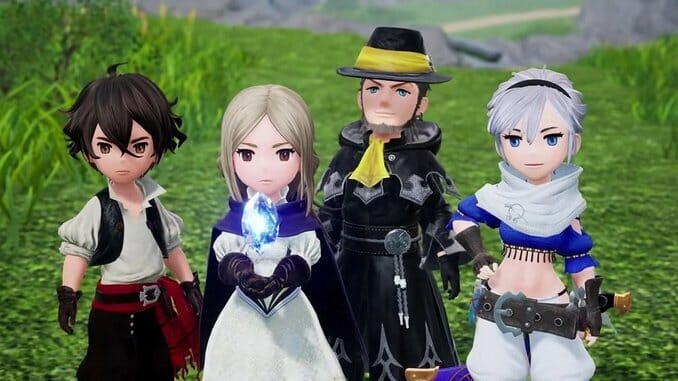Bravely Default 2: Welcome to Default World

Bravely Default was a risky game.
Released in the early 2010s, the 3DS title came out during a time of relative silence for the JRPG genre. Handheld games of a similar vein—“love letters” to classic JRPGs like Final Fantasy: The 4 Heroes of Light and Nostalgia—had mostly fallen on deaf ears. Conceived as a sequel to 4 Heroes, Bravely Default eventually warped into a mishmash of disparate JRPG conventions taking from Final Fantasy III and V with a splash of Dragon Quest, SaGa, and the less-known Brave Story.
Somehow, it worked. With a hefty amount of chibi charm, Bravely Default impishly played with our expectations going into a seemingly standard RPG. With a shocking 11th hour twist, addictive and exploitable job-based gameplay, and a story that was just competent enough, the game attained a cult following and signalled the beginning of a revival for retro-style JRPGs. In its wake, games like Octopath Traveler and Dragon Quest XI, as well as Western-developed indie efforts like Cosmic Star Heroine and, of course, Undertale, would find great success remixing elements of RPG favorites from the ‘90s. Bravely Default served as ample proof that JRPGs can still be interesting in their own right—that their evolutionary arc need not pivot towards conventional forms of innovation, but instead could toy with the familiar tropes that we love them for and that still feel fresh and exciting.
This is precisely why Bravely Default 2 doesn’t quite work. The game starts much the same way the original does; Gloria, the former princess of the dead kingdom Musa, is charged with recovering the four elemental crystals she lost the day Musa was sacked by the Holograd Empire. Three years after its destruction, Gloria is led by the Wind Crystal to Seth, a shipwrecked sailor found unconscious on the beach. Soon after they’re joined by Adelle and Elvis, who round out our group of quirky, statistically-interchangeable adventurers with a diverse set of European accents. The game wastes no time in throwing you directly into the action; within 30 minutes, you’ve got your first asterisk (Elvis comes equipped with the Black Mage job), have your full party, and are on your way to fight your first set of bosses.

A level of pathos is lost in the mad dash to the first chapter. By the game’s start, Musa’s destruction is a distant memory. Our entire investment in Gloria’s mission is dependent on her unwavering sense of duty, echoing familiar Final Fantasy heroines like X’s Yuna and XII’s Ashe. But unlike Yuna and Ashe, we see little of the needless destruction that led them to their resolve. We don’t see Gloria’s fall from grace and crumble into submission. As we move from chapter to chapter, time seems frozen in place, waiting for the protagonists to arrive and solve their resident problems they have seemingly been toiling with for years. Nothing in the continent of Excillant goes unobserved by the party; the world feels like a lifeless diorama, waiting to be beaten into flaccidity with clever job combinations.
-

-

-

-

-

-

-

-

-

-

-

-

-

-

-

-

-

-

-

-

-

-

-

-

-

-

-

-

-

-

-

-

-

-

-

-

-

-

-

-









































